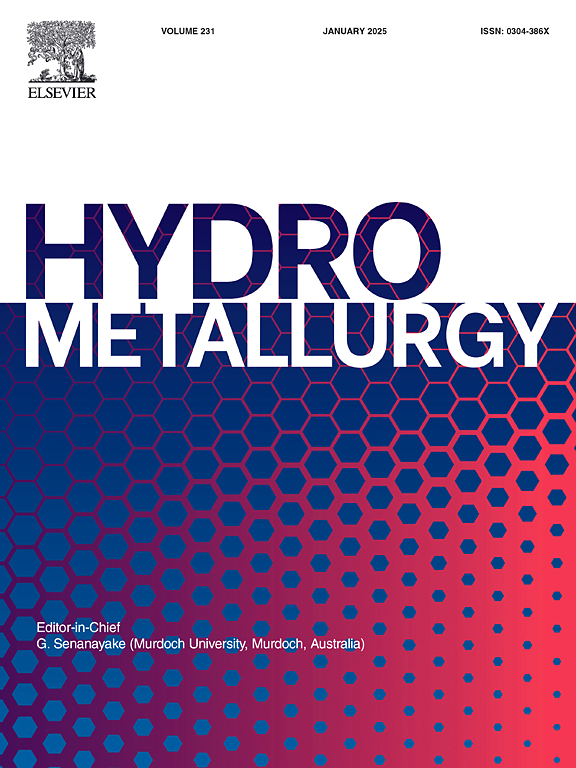Technological advancements in rare earth elements recovery from ionic clays: A comprehensive review
IF 4.8
2区 材料科学
Q1 METALLURGY & METALLURGICAL ENGINEERING
引用次数: 0
Abstract
The growing demand for rare earth elements, pivotal for modern technologies, has necessitated the development of efficient and sustainable extraction methods from ionic clays. This review provides a comprehensive analysis of the advancements in rare earth recovery from ionic clays, focusing on the geological, geochemical, and technological aspects of the extraction processes. Historically, traditional methods of extracting rare earths from mineral ores have been environmentally detrimental and economically intensive due to their complex multi-step procedures and the handling of radioactive materials. In contrast, ionic clays, primarily found in weathered crusts of granite and volcanic rocks, offer a more accessible source of rare earths, particularly heavy rare earth elements (HREEs), through simpler ion exchange processes. The necessity to discuss this topic arises from the increasing environmental and economic pressures to find greener and more sustainable methods of rare earth extraction. The review highlights the transition towards environmentally friendly leaching agents, such as non-ammonium salts, and the integration of advanced techniques like microbial adsorption and solvent extraction. These innovations aim to enhance extraction efficiency while reducing ecological footprints. Additionally, the review highlights the importance of understanding the geological conditions that favor the formation of ionic rare earth deposits, such as climate, topography, and geological history, which are critical for efficient prospecting and exploitation. Moreover, the paper presents a life cycle analysis of in-situ leaching of rare earths from ionic clays, a method that minimizes surface disruption and environmental impact compared with conventional mining. The efficacy of this method is evaluated through case studies and field implementations, demonstrating significant improvements in efficiencies of recovery and operational sustainability. In conclusion, this review emphasizes the strategic importance of rare earth extraction from ionic clays, not only to meet the rising global demand but also to support the advancement of green technologies essential for a sustainable future. It calls for continued research into alternative extraction technologies and methods that balance economic feasibility with environmental responsibility, ensuring the sustainable exploitation of these critical resources.
从离子粘土中回收稀土元素的技术进步:全面回顾
稀土元素是现代技术的关键,随着对稀土元素需求的不断增长,有必要开发高效、可持续的离子粘土萃取方法。本综述全面分析了从离子粘土中回收稀土的进展,重点关注萃取工艺的地质、地球化学和技术方面。从历史上看,从矿石中提取稀土的传统方法因其复杂的多步骤程序和放射性材料的处理而对环境造成危害,并具有高经济性。相比之下,主要存在于花岗岩和火山岩风化壳中的离子粘土通过更简单的离子交换过程提供了更容易获得的稀土来源,特别是重稀土元素 (HREE)。讨论这一主题的必要性源于日益增长的环境和经济压力,即寻找更环保、更可持续的稀土提取方法。综述强调了向环境友好型浸出剂(如非铵盐)的转变,以及微生物吸附和溶剂萃取等先进技术的整合。这些创新旨在提高萃取效率,同时减少生态足迹。此外,综述还强调了了解有利于离子型稀土矿床形成的地质条件(如气候、地形和地质历史)的重要性,这对于高效勘探和开采至关重要。此外,论文还对从离子粘土中原地沥滤稀土的生命周期进行了分析,与传统采矿法相比,这种方法可最大限度地减少地表破坏和对环境的影响。通过案例研究和实地实施,对该方法的功效进行了评估,结果表明,回收效率和运营可持续性都有显著提高。总之,本综述强调了从离子粘土中提取稀土的战略重要性,这不仅是为了满足不断增长的全球需求,也是为了支持对可持续未来至关重要的绿色技术的发展。它呼吁继续研究替代提取技术和方法,在经济可行性和环境责任之间取得平衡,确保这些关键资源的可持续开发。
本文章由计算机程序翻译,如有差异,请以英文原文为准。
求助全文
约1分钟内获得全文
求助全文
来源期刊

Hydrometallurgy
工程技术-冶金工程
CiteScore
9.50
自引率
6.40%
发文量
144
审稿时长
3.4 months
期刊介绍:
Hydrometallurgy aims to compile studies on novel processes, process design, chemistry, modelling, control, economics and interfaces between unit operations, and to provide a forum for discussions on case histories and operational difficulties.
Topics covered include: leaching of metal values by chemical reagents or bacterial action at ambient or elevated pressures and temperatures; separation of solids from leach liquors; removal of impurities and recovery of metal values by precipitation, ion exchange, solvent extraction, gaseous reduction, cementation, electro-winning and electro-refining; pre-treatment of ores by roasting or chemical treatments such as halogenation or reduction; recycling of reagents and treatment of effluents.
 求助内容:
求助内容: 应助结果提醒方式:
应助结果提醒方式:


